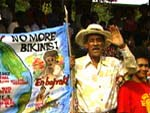New Orleans On my recent trip between New Orleans, Manila, and San Francisco, a remarkable thing happened to me. Friends gave me three books. It was a wonderful way of all three to them communicating directly with me in a way that might have been impossible to conceive otherwise, and leads me to want to share these gives as well.
Emmett Aluli, the pioneering doctor on Molokai, activist, leader, and organizer in Hawaii for a generation, and my friend and comrade, mulled a book that was 10 years in the making by his partner, Davianna Pomaikai McGregor, who I have also been honored to know and visit. Davi, Emmett, others and me hiked to the top of Molokai when I visited him there. I talked often with Davi about her book and her research and she introduced me to some of her colleagues at the University of Hawaii, where she is a professor of ethnic studies. The book is Na Kuaaina: Living Hawaiian Culture and is already in its 2nd printing. On the cover is a picture of Uncle Harry Kunihi Mitchell, who Davi uses to set the tone for the book in a most moving way. On the her first trip to Kahoolawe, the island that Emmett and others campaign successfully to block as a bombing target for the U.S. Navy so that it could be returned to its sacred and traditional purposes, she relates the story of Uncle Harry showing her how to pay attention to the natural and listen to what it was teaching, and thereby sets the tone for a moving book that documents the sturdy and still robust and fertile native culture in Hawaii.
Earlier Denis Murphy, the guiding hand behind much of the community organizing in Asia over the last 35 years, gave me a copy of his most recent book of short stories, many of which include vignettes about organizing and all of which focus on the urban poor and sometimes their intersection with the Church. The first time I had visited the Philippines, Denis had given me a copy of his novel, A Watch in the Night, which I had not been able to put aside until I finished it on my flight back to the States since it was a captivating story of organizing during the Marcos years. I was surprised to see that the book he was giving me, A Woman Pope, Neanderthals, and Other Stories, was his 4th collection of short stories. How unusual and inspiring that Denis has been able to find an outlet for some of his experience in fiction!
Finally, the staff and board of the Tides Center surprised me recently in San Francisco. I had stepped down as the chair of the Center after 11 long years and promptly at noon had sneaked down the hall to make two promised phone calls, even while the meeting was still marching towards a conclusion. I had confessed repeatedly over the last year that I simply no longer had the time to be on point so these calls finally were guiltless. Coming back to the meeting 20 minutes later I was confused why the entire staff was standing in the hallway as I returned, but I assumed they were invited to lunch since that was also laid out. Walking into the room I found the board standing and Ellen Friedman, the dynamic sparkplug of the Tides family of organizations and our acting ED of the last year, beaming, as I quickly discovered, in the knowledge that she had once again pulled one on me, since she and the board had decided to pay me back for my years of service as chair by embarrassing me completely! In one part of Ellen’s ceremony she pulled out a book, which the board gave me by Terry Tempest Williams called The Open Space of Democracy. Ellen read an excerpt from the book that she felt embodied my work and spirit, and in the always stark and natural metaphors of Ms. Williams, was clearly moving. I’m not sure exactly which section she wrote, but I think it was:
“Democracy invites us to take risks. It asks that we vacate the comfortable seat of certitude, remain pliable, and act, ultimately, on behalf of the common good. Democracy’s only agenda is that we participate and that the majority voice be honored. It doesn’t matter whether an answer is right or wrong, only that ideas be heard and discussed openly.”
There is something about a book, either written by friends and comrades, or held close to them that seems to communicate a message straight from one heart and soul to another that has a power, even in this age of immediacy, that is almost impossible to duplicate and transcend.
